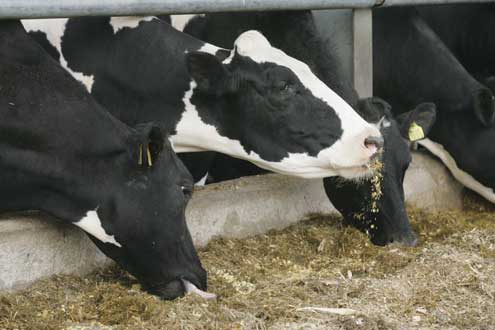Boosting dairy and beef rations with bioethanol by-products

Bioethanol products in the form of distillers’ grains are becoming increasingly available as plants such as Ensus and Vivergo kick into gear.
And as soya bean and cereal prices continue to rise, the by-products of bioethanol production could offer a low-cost, high-protein and high-energy feed that could substitute some of the more expensive components of livestock diets.
Traditional thinking has in the past limited distillers’ grain inclusion in dairy rations to 10%. However, new research suggests they could be included at a higher rate when the ration is presented for feeding correctly.
Including 20% of distillers’ grains in a dairy cow ration has the potential to reduce feed costs by 56p a cow a day, explained Keenan market manager Thorkild Moos.
| Technical specification (DM basis) of dried distillers’ grains from wheat | |
|---|---|
| Dry matter (%) | 92 |
| Energy (MJ ME/kg DM) | 13.7 |
| Crude protein (%) | |
| Oil (%) | 6.5 |
| NDF (%) | 29 |
| Starch (%) | 2 |
| Sugars | 1 |
| Source: Trident Feeds | |
“Traditional inclusion levels of distillers’ grains have been restricted to less than 10% in dairy rations due to issues with milk fat depression, excessive intakes and poor health at higher levels. However, research now suggests the physical mix of the ration could affect the use of co-products in cow feeding,” he said.
But care must be taken when feeding a ration containing high levels of distillers’ grains, as unsuccessful inclusion could reduce income over total feed by 30p a cow a day.
A study by the University of Illinois, which fed increasing levels of maize distillers’ grains using two different mixer wagons; a Keenan fitted with performance acceleration and control enhancement (PACE) and a vertical auger mixer, found rations fed through the Keenan created more favourable rumen fermentation and resulted in better feed use.
“The results from the study showed a clear advantage for the Keenan when feeding high levels of distillers’ grains,” said Mr Moos. “High milk components and energy-corrected milk yield, combined with a lower dry matter intake, resulted in higher feed conversion efficiency and increased profit.”
| Technical specification (DM basis) of distillery syrups | |
|---|---|
| Dry matter (%) | 24-45 |
| Energy (MJ ME/kg DM) | 13-14 |
| Crude protein (%) | 30-35 |
| Oil (%) | 5-7 |
| Source: Trident Feeds | |
Mr Moos said these outcomes were driven by a different mix type being presented with the Keenan Mech-Fiber mixer. “The Keenan mix meant cows were able to handle the challenge introduced with increased maize wheat distillers’ grains, resulting in a different fermentation and metabolism of fat in the rumen.”
BEEF
Distillers’ grain inclusion in beef rations has also been traditionally restricted to 20% of dry matter intake. However, with Keenan Mech-Fiber this can be increased to 37%, explained Keenan’s Mark Voss.
“Research has found that feeding distillers’ grains at higher feed rates with a Keenan resulted in no loss in feed conversion efficiency. There was also carcass quality gains with improved yield grades, which, calculated at current UK beef prices, could bring a 25p/kg deadweight price advantage to these cattle.”
And Mr Voss said margin gains could be as high as £120 for every feed space when comparing zero co-product inclusion to the highest feed rates.
Keep up to date with all the latest feed market news
